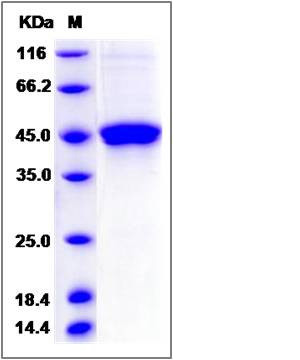Rat GITR / TNFRSF18 Protein (Fc Tag)
TNFRSF18
- 100ug (NPP1300) Please inquiry
| Catalog Number | P80192-R02H |
|---|---|
| Organism Species | Rat |
| Host | Human Cells |
| Synonyms | TNFRSF18 |
| Molecular Weight | The recombinant rat TNFRSF18/Fc is a disulfide-linked homodimer. The reduced monomer comprises 338 amino acids and has a predicted molecular mass of 37.7 kDa. The apparent molecular mass of the protein is approximately 47 kDa in SDS-PAGE under reducing conditions. |
| predicted N | Glu 25 |
| SDS-PAGE |  |
| Purity | > 95 % as determined by SDS-PAGE |
| Protein Construction | A DNA sequence encoding the rat TNFRSF18 (Q5M835) (Met1-Lys121) was expressed, fused with the Fc region of human IgG1 at the C-terminus. |
| Bio-activity | |
| Research Area | Signaling |Signal Transduction |Growth Factor & Receptor |Tumor Necrosis Factor (TNF) & Receptor |TNF Receptor |
| Formulation | Lyophilized from sterile PBS, pH 7.4 1. Normally 5 % - 8 % trehalose, mannitol and 0.01% Tween80 are added as protectants before lyophilization. Specific concentrations are included in the hardcopy of COA. |
| Background | GITR, also known as TNFRSF18(CD357), belongs to the tumor necrosis factor receptor (TNF-R) superfamily. It is the receptor for TNFSF18. GITR plays a key role in dominant immunological self-tolerance maintained by CD25(+)CD4(+) regulatory T cells. GITR may be involved in interactions between activated T-lymphocytes and endothelial cells and in the regulation of T-cell receptor-mediated cell death. GITR and its ligand are important costimulatory molecules in the pathogenesis of autoimmune diseases. It also mediates NF-kappa-B activation via the TRAF2/NIK pathway. |
| Reference |
